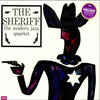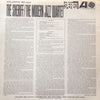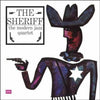





The Modern Jazz Quartet - The Sheriff
John Lewis (piano)
Milt Jackson (vibraharp) [click here to see more vinyl featuring Milt Jackson]
Percy Heath (bass)
Connie Kay (drums)
Written by John Lewis (A1, A2, B2), Heitor Villa-Lobos (A3), Fred E. Ahlert (A4), Roy Turk (A4), Leonard Feather (B1), John Lewis (B1), Luiz Bonfá (B3), Ross Jungnickel (B3)
1 LP, standard sleeve
Original analog Master tape : YES
Heavy Press : 180g
Record color : black
Speed : 33 RPM
Size : 12'’
Stereo
Studio
Record Press : Unspecified
Label : Pure Pleasure Records
Original Label : Atlantic
Recording : May 16 & 17 and December 20, 1963 in New York Cityby Tom Dowd & Phil Iehle,
Produced by: Nesuhi Ertegun
Originally released in 1964
Remastered by Ray Staff at Air Mastering, Lyndhurst Hall, London
Reissued in 2018
Tracks :
Side A :
1. The Sheriff
2. In A Crowd
3. Bachianas Brasileiras
4. Mean To Me
Side B :
1. Natural Affection
2. Donnie’s Theme
3. Carnival
Reviews :
"Recorded in 1963, The Sheriff features the Modern Jazz Quartet in fine swinging form. The program is not as sharply focused as on some of the earlier Atlantic releases, but it is compelling nonetheless. There are four originals by pianist John Lewis, including the fleeting, bluesy title cut, and the moody, spacious "In a Crowd" -- originally composed for the 1961 film A Milanese Story. Its stepped-up time signature and series of phrases played by Milt Jackson grounds the tune in blues, but Lewis' solo feels more like a solo trumpet breezing through the center.
The set includes Heitor Villa-Lobos' "Bachianas Brasileiras," a classical piece the quartet first performed with guitarist Laurindo Almeida. Bassist Percy Heath is stellar here, playing both arco and pizzicato and alternately moving the work forward with deftness and precision. Lewis and Jackson engage in gorgeous counterpoint throughout. It's knotty, but exotic and beautiful. Another Latin-based work here is Luiz Bonfa's brilliant "Carnival," which closes the set. Jackson's melodic interplay with Connie Kay's brushwork is subtle and rich, moving through a series of verses before Jackson takes it to the blues in his solo. Lewis keeps the pulse as Heath underscores the backbeat." Thom Jurek/AMG
"The Modern Jazz Quartet was an integral part of the cool jazz movement. With relaxed tempos and formal arrangement (like classical music), this departure from frenetic atonal bebop was pioneered by Miles Davis. Earlier influences on cool jazz included trumpeter Bix Beiderbecke and tenor saxophonist Lester Young. A preference for melodic flows rather than wilder chord manipulations were important characteristics.. Bebop had some of the core elements of cool jazz. This new sound was referred to as softer bebop, but that was oversimplified. Players like Davis, Gill Evans, Lee Konitz, Stan Kenton, Dave Brubeck, Jimmy Giuffre, Paul Desmond, Gerry Mulligan and Zoot Sims were advocates of cool jazz.
Fans of this group can always expect the unexpected. That’s what they get on “Bachian As Brasileiras”. Written by the legendary Brazilian classical composer Heitor Villa-Lobos, MJQ performed this number with guitarist Laurindo Almeida at the 1963 Monterey Jazz Festival. The “souped up” jazz version is exhilarating. Lewis and Jackson play in a dynamic counterpoint of classical and blues imagery. Double bassist Percy Heath is extraordinary and diverse (pizzicato and arco) and creates an ominous ambience with his bowed play. There is a subtle 3/4 tempo shift and a Latin-infused ending. Jackson brings the jam to a breathless hush with a reverberating single note. “Mean To Me” has always seemed an unlikely jazz vehicle, but became a standard. Lewis’ chords intermingle seamlessly with Jackson’s sizzling lines that almost reinvent the melody). The slowed-down beginning gets a polyrhythmic “hot” break with Heath’s hard-driving bass and Connie Kay’s superb cymbals and snare.
Another Lewis opus, “Natural Affection” (composed for the William Inge play of the same name) is pure bossa nova grooves (reflective of 1964). Lewis’ breezy, at times ethereal solo is melodic. He joins the rhythm section in chord progressions against Jackson’s stylized riffs. A second composition from Natural Affection, “Donnie’s Theme” opens with Heath in a brief counter with Bags. The quartet morphs into a downbeat jam with vibraphone sustain. Lewis and Jackson blend their simultaneous “dueling solos”. Lewis’ runs are very jazzy and Heath briefly solos to the close. Must of the album’s cuts are concise with the exception of “Bachian As Basileiras’ (5:43) and the ultimate finale, Luiz Bonfa’s “Carnival” (6:06). Also known as “Manha De Carnaval”, this widely renowned theme from Black Orpheus has enjoyed several celebrated versions, but this is one is memorable. There is unadulterated MJQ mojo, with all four members playing cohesively. Jackson’s initial solo approximates the core melody before the improvisational transition. Lewis is not as flashy, but injects a winsome lyricism that permeates the song. Bags returns for a second definitive run with a glowing echo at the end.
Pure Pleasure Records has re-mastered The Sheriff to vibrant 180-gram vinyl. The integrity of Tom Dowd’s (record producer and engineer whose decades-long career is beyond legendary) source engineering is captured with integrity. The stereo separation is flawless (with vibes on left and piano on right). The idiosyncratic tonalities of the vibraphone are all there, including the precise crispness and looser vibrato. The studio effects have echo and reverberation, but in measured amounts. The original packaging with the “high fidelity” references to R.I.A.A. high-frequency roll-off and 500 cycle crossover are a glimpse into vintage recording. As indicated previously, Leonard Feather’s incisive liner notes are brilliant, as is the “Modern Art” cover." Audiophile Audition August 2018 by Robbie Gerson
Ratings :
Allmusic : 3 / 5


